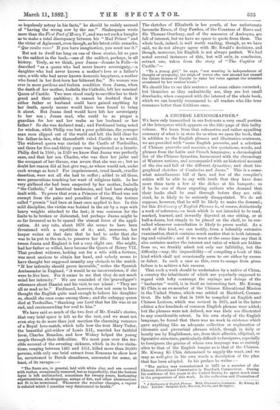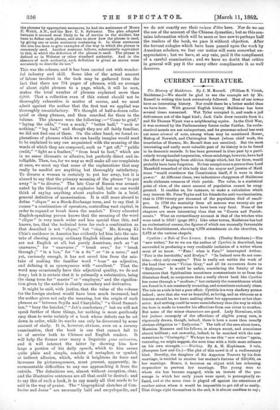A CHINESE LEXICOGRAPHER.*
WE have only transcribed in our foot-note a very small portion of the letterpress which appears on the title-page of this bulky volume. We learn from that exhaustive and rather appalling summary of what is in store for us when we open the book, that in addition to the English phrases and illustrative sentences, we are provided with " some English proverbs, and a selection of Chinese proverbs and maxims, a few quotations, words, and phrases from the Latin and French languages ; a chronological list of the Chinese dynasties, harmonised with the chronology of Western nations, and accompanied with an historical account of the rise and fall of the different dynasties ; and short bio- graphical sketches of Confucius and Jesus." This is a some-
what miscellaneous bill of fare, and few of the compiler's critics will be able to say with truth that they have done more than taste a few of the dishes at his banquet ; so if he be one of those expecting authors who demand that their books shall be read through before they are criti- cised, he is likely to be seriously disappointed. We do not suppose, however, that he will be likely to make the demand ;
for this Dictionary of English Phrases is, of course, distinctively a work of reference,—a book which is not intended to be read, marked, learned, and inwardly digested at one sitting, or at half-a-dozen, but simply to be placed on the shelf, to be con- sulted whenever consultation is likely to prove useful. As a work of this kind, we can testify, from a tolerably extensive
examination, that it contains much matter that is both interest- ing and valuable ; and if we must at the same time say that it also contains matter the interest and value of which are hidden from us, we frankly admit not only our fallibility, but the difficulty—nay, the impossibility—of compiling a book of this kind which shall not occasionally seem to err either by excess or defect. In such a case as this, even to escape from gross failure is to achieve a fair success.
That such a work should be undertaken by a native of China, a country the inhabitants of which are popularly supposed to regard with lofty contempt the sayings and doings of the " barbarian" world, is in itself an interesting fact. Mr. Kwong Ki Chin is an ex-member of the Chinese Educational Mission in the United States, which was settled at Hartford, Connec- ticut. He tells us that in 1868 he compiled an English and Chinese Lexicon, which was revised in 1875, and in the latter edition a few hundreds of common English phrases were added; but the phrases were not defined, nor was their use illustrated to any considerable extent. In his own study of the English language, he found that there was no work in existence which gave anything like an adequate collection or explanation of idiomatic and proverbial phrases which, though in daily or hourly use by Englishmen, are, from their allusive, elliptical, or figurative structure, particularly difficult to foreigners, especially to foreigners the genius of whose own language was so entirely alien to that of the English tongue as is that of the Chinese. Mr. Kwong Ki Chin determined to supply the want, and we may as well give in his own words a description of the plan that has been adopted. In his preface he writes :—
" The author was commissioned in 1875 as a member of the Chinese Educational Commission in Hartford, Connecticut. Daring his residence of five years in the United States, he spent much time in the preparation of this work. In the collection and illustration of • A Dictionary of English Phrases. with Illustrative Sentences. By Ewong EL Chin. London: Sampson Low, Marston, Searle, and Itivington.
the phrases by appropriate sentences, he had the assistance of Moses C. Welch, A.M., and the Rev. C. S. Sylvester. The plan adopted because it seemed most likely to be of service to the student, has been to define each phrase, and also to show how the phrase is used, by giving one or more sentences containing it. In these sentences the aim has been to give examples of the way in which the phrase is commonly used. Another sentence follows, substantially equivalent to this, in which the definition of the phrase is used. The phrase is defined as in Webster or other standard authority. And in the absence of such anthority, such definition is given as seems most accurately to describe its use."
This was the scheme, and it has been carried out with wonder- ful industry and skill. Some idea of the actual amount of labour involved in the task may be gathered from the fact that there are 794 pages of phrases, with an average of about eight phrases to a page, which, it will be seen, makes the total number of phrases explained more than 6,000. That a collection even of this extent should not be thoroughly exhaustive is matter of course, and we must admit against the author that the first test we applied was thoroughly unsatisfactory. We thought of half-a-dozen collo- quial or slang phrases, and then searched for them in the volume. The phrases were the following Come to grief," " laying the odds," "run a muck," " better half," " neck or nothing," " leg bail," and though they are all fairly familiar, we did not find one of them. On the other hand, we found ex- planations of phrases which we can hardly imagine would need to be explained to any one acquainted with the meaning of the words of which they are composed, such as " get off," " public credit," "light as a feather," " from head to foot," which are in no sense idiomatic or allusive, but perfectly direct and in- telligible. Then, too, for we may as well make all our complaints at once, we must say that some of the explanations that may really be needful are anything but thoroughly satisfactory. To divorce a woman is certainly to put her away, but it is absurd to say that the primary meaning of the phrase " to put away " is " to divorce." The late Czar of Russia was assassi- nated by the throwing of an explosive ball, but no one would think of saying anything about explosive balls in a brief, general definition of assassination. It is still more absurd to define " clique " as a Stock-Exchange term, and to say that it means " a combination of operators, controlling vast capital, in order to expand or break down the market." Every educated English-speaking person knows that the meaning of the word "clique" is very much wider and less special than this, and knows, too, that the technical term for such a combination as that described is not "clique," but "ring." Mr. Kwong Iii Chin's residence in America has evidently led him into the mis- take of classing among ordinary English idioms phrases that are not English at all, but purely American, such as " at unawares," for " unawares ;" " break over," for " break through ;" " in a box," for " in a fix " or " in a mess ;" and yet, curiously enough, it has not saved him from the mis- take of making the familiar word " boss " an adjective, and defining it as synonymous with " excellent." That the word may occasionally have this adjectival quality, we do not deny ; but it is certain that it is primarily a substantive, being the slang term for " master " or "employer," and the significa- tion given by the author is clearly secondary and derivative.
It might be said, with justice, that the value of the volume for the foreign student would have been much increased, had the author given not only the meaning, but the origin of such phrases as "between Scylla and Charybdis," "a Good Samari-
tan," " bury the hatchet," " Job's comforters ;" but we will not speak further of these things, for nothing is more...perilously easy than to write unfairly of a book whose defects can be set
down in order, while its merits can only be discovered by some amount of study. It is, however, obvious, even on a cursory examination, that the book is one that cannot fail to be of service both to Chinese and English readers. It will help the former over many a linguistic pens asinorani, and it will interest the latter by showing him how large a portion of his daily speech, which to him seems quite plain and simple, consists of metaphor, or symbol, or indirect allusion, which, while it heightens its force and increases its picturesqueness, must present, apparently, in- surmountable difficulties to any one approaching it from the
outside. The definitions are, almost without exception, clear, and the illustrative sentences are all that could be desired ; and to say this of such a book, is to say nearly all that needs to be said in the way of praise. The " biographical sketches of Con- fucks and Jesus " are necessarily bald and encyclopaedic; and
we do not exactly see their raison d'are here. Nor do we see the use of the account of the Chinese dynasties ; but as this con- tains information which will be more or less new to perhaps half the readers of the book, we pass it without objection. After the fervent eulogies which have been passed upon the work by American scholars, we fear our notice will seem somewhat un- appreciative ; but we have, at any rate, paid it the compliment of a careful examination ; and we have no doubt that critics in general will pay it the many other compliments it so well deserves.



































 Previous page
Previous page